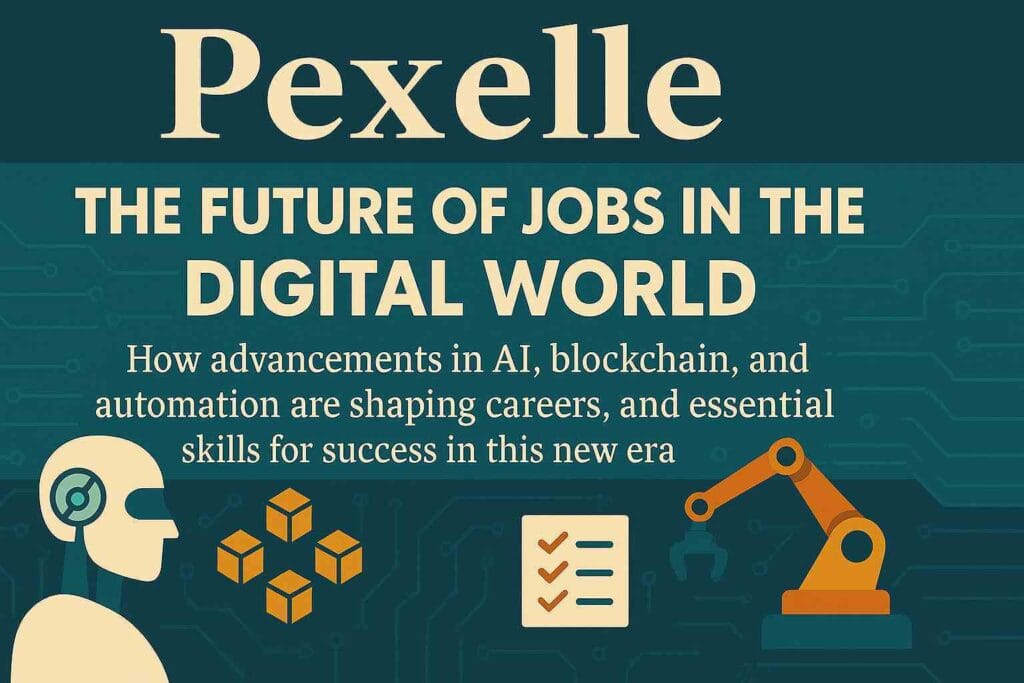The Future of Jobs in the Digital World

The rapid evolution of technology has brought transformative changes to nearly every aspect of our lives. The rise of Artificial Intelligence (AI), Blockchain, and Automation has reshaped industries, work processes, and the very nature of work itself. In this article, we will explore how these advancements are influencing job markets, the emerging trends in careers, and the key skills required for success in this rapidly changing digital world.
The Impact of Artificial Intelligence on Jobs
Artificial Intelligence (AI) has become one of the most significant forces driving changes in the workforce. AI systems are capable of automating complex tasks, analyzing vast amounts of data, and making decisions that were once reserved for humans. While AI promises to enhance productivity and efficiency, it also presents challenges. Many routine and repetitive tasks are now being automated, which could lead to job displacement in industries such as manufacturing, retail, and customer service.
However, AI is not solely a disruptor—it is also a creator of new job opportunities. For instance, fields like AI ethics, machine learning, data analysis, and AI programming are emerging rapidly. As AI continues to evolve, the demand for professionals who can design, implement, and manage AI systems will grow. Those who adapt to the AI revolution will find opportunities in industries ranging from healthcare and finance to entertainment and education.
Blockchain and the Transformation of Jobs
Blockchain technology, often associated with cryptocurrencies like Bitcoin, is far more than just a financial tool. It is a decentralized, secure, and transparent method of recording transactions, which is being adopted across various sectors such as banking, supply chain management, and healthcare. Blockchain has the potential to revolutionize industries by improving data security, reducing fraud, and ensuring transparency.
As Blockchain becomes more mainstream, there will be an increasing demand for blockchain developers, smart contract engineers, and cybersecurity experts. The ability to understand blockchain’s underlying principles, its applications, and how to integrate it into business solutions will become a valuable skill. For those in the finance and logistics sectors, understanding how blockchain can streamline transactions and secure data will be crucial.
Automation and the Future of Work
Automation, powered by robotics and AI, is transforming how tasks are performed in various industries. From automated warehouses to self-driving cars, the impact of automation is widespread. The traditional roles that required human labor for tasks such as assembly, inventory management, and data entry are being replaced or augmented by machines.
While automation may lead to job displacement in some areas, it also creates new jobs that require more complex problem-solving, creativity, and oversight of automated systems. Workers will need to adapt by learning how to work alongside machines, supervising automated processes, and applying their creativity to tasks that machines cannot handle.
The Essential Skills for Success in the Digital World
In the face of these technological disruptions, certain skills will be indispensable for success in the future job market. Here are some of the most crucial skills for thriving in a digital-first world:
- Technical Proficiency: Understanding how AI, Blockchain, and Automation work will be essential for those looking to stay competitive in the job market. Skills in programming, data science, and cybersecurity will be in high demand.
- Adaptability and Lifelong Learning: As technologies evolve rapidly, the ability to adapt and continuously learn new skills will be a key factor for career success. Professionals must be proactive in acquiring new knowledge and staying current with technological advancements.
- Critical Thinking and Problem-Solving: While machines are good at processing data, humans excel at solving complex problems. The ability to think critically, make decisions based on data, and solve problems creatively will continue to be essential in a digital world.
- Emotional Intelligence and Communication: In an increasingly automated world, human-centric skills like emotional intelligence, leadership, and communication will remain crucial. These skills are particularly important in fields such as customer service, healthcare, and leadership roles.
- Cybersecurity Awareness: As the world becomes more interconnected, the need for robust cybersecurity measures will increase. Knowledge of cybersecurity principles and how to protect data will be essential for professionals in nearly every industry.
- Data Literacy: Understanding and interpreting data is becoming a core skill in every sector. Professionals who can analyze and derive insights from large datasets will be highly valued, particularly as businesses rely more heavily on data-driven decision-making.
Conclusion
The digital world is evolving at an unprecedented pace, and technological advancements like AI, Blockchain, and Automation are playing a central role in reshaping the future of work. While these technologies may cause disruptions in traditional job roles, they also open up exciting new career opportunities for those willing to adapt and acquire new skills. As we move into this new era, staying informed, learning continuously, and embracing the changes will be the keys to success in the future job market.
Source : Medium.com




